How to Meditate for Reducing the Effects of Negative Stress sets the stage for this enthralling narrative, offering readers a glimpse into a story that is rich in detail with formal with serious tone style and brimming with originality from the outset.
This topic delves into the profound benefits of meditation in combating the detrimental effects of stress, providing a comprehensive guide on various techniques and practices to achieve mental well-being.
Introduction to Meditation for Stress Reduction
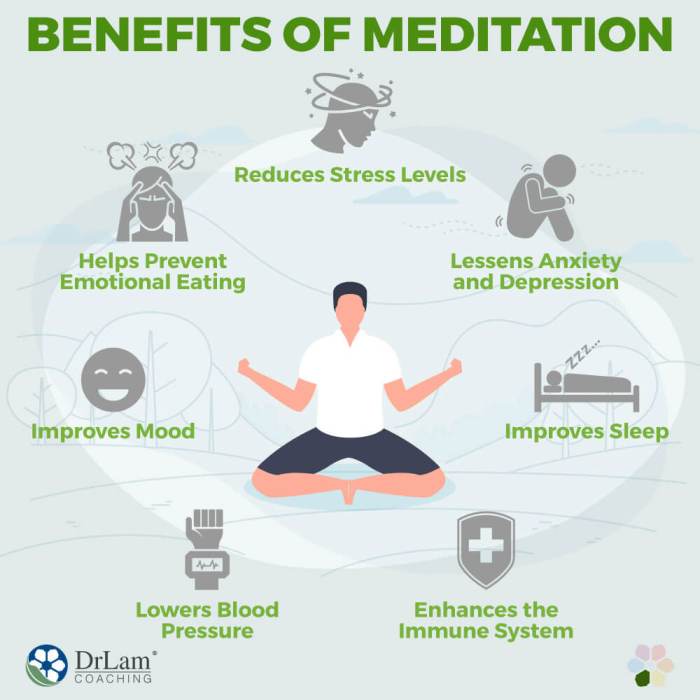
Meditation is a practice that involves focusing the mind and eliminating distractions to achieve a state of mental clarity and emotional calmness. It has been used for centuries as a means of promoting relaxation, inner peace, and overall well-being.
Benefits of Meditation in Reducing Negative Stress
- Meditation helps in reducing the production of stress hormones like cortisol, which can have harmful effects on the body when present in high levels.
- Regular meditation practice can lower blood pressure, improve heart rate variability, and enhance the body’s ability to handle stress.
- By calming the mind and promoting mindfulness, meditation can reduce feelings of anxiety, depression, and overall psychological distress.
Impact of Regular Meditation Practice on Mental Health
- Meditation can increase self-awareness and self-acceptance, leading to a more positive outlook on life and improved emotional well-being.
- Regular meditation practice can enhance concentration, memory, and cognitive function, which are often impaired by chronic stress.
- By promoting relaxation and reducing negative emotions, meditation can help individuals better cope with daily challenges and improve their overall quality of life.
Understanding Negative Stress and its Effects
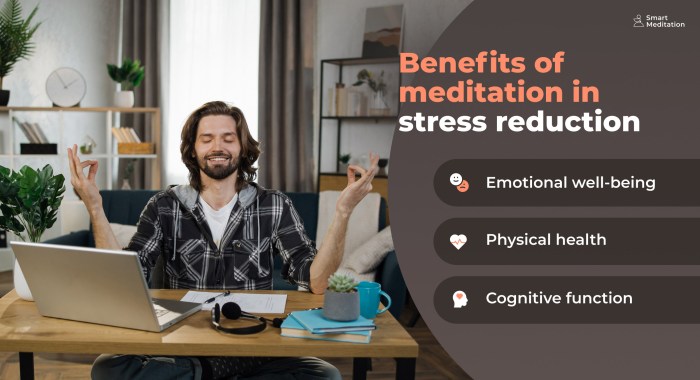
Negative stress, also known as distress, refers to the harmful, overwhelming feeling of pressure that can have detrimental effects on a person’s physical and mental well-being. This type of stress can arise from various sources and lead to a range of symptoms that can significantly impact an individual’s quality of life.
Definition and Symptoms of Negative Stress
Negative stress is characterized by feelings of anxiety, irritability, and fatigue, which can manifest as physical symptoms such as headaches, muscle tension, and digestive issues. Additionally, individuals experiencing negative stress may also struggle with sleep disturbances, changes in appetite, and difficulty concentrating.
Impact of Negative Stress on Physical and Mental Well-being
Negative stress can have a profound impact on both physical and mental health. Chronic exposure to stress hormones like cortisol can weaken the immune system, increase the risk of cardiovascular disease, and contribute to the development of conditions such as depression and anxiety disorders. Additionally, prolonged negative stress can lead to burnout, exhaustion, and a decreased ability to cope with daily challenges.
Examples of Situations Leading to Negative Stress
Work-related pressures
Tight deadlines, high workloads, and conflicts with colleagues can contribute to negative stress in the workplace.
Seeking peace within yourself can be a transformative experience that leads to a deeper understanding of your inner self. Through meditation, you can explore your thoughts and emotions to find a sense of harmony and tranquility. Learn more about How to Meditate for Finding Peace Within Yourself and begin your journey towards self-discovery.
Relationship issues
Difficulties in personal relationships, conflicts with family members, or social isolation can lead to distress.
Financial worries
Struggling with debt, job insecurity, or financial instability can cause significant negative stress.
Health concerns
Dealing with chronic illnesses, injuries, or medical conditions can be a source of distress and anxiety.
Overcoming fear and insecurity is a common struggle for many individuals, but meditation can provide a path towards healing and empowerment. By practicing mindfulness and self-reflection, you can confront your fears and insecurities with courage and strength. Explore techniques on How to Meditate for Overcoming Fear and Insecurity to overcome your inner obstacles and find peace within.
Techniques for Meditating to Reduce Negative Stress
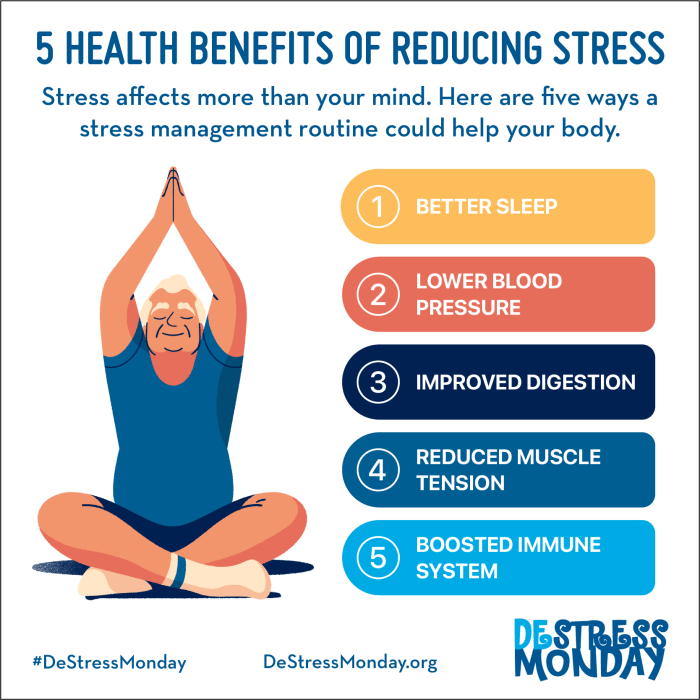
Meditation can be a powerful tool for reducing negative stress and promoting relaxation. There are several techniques that can be effective in combating stress and anxiety.
When it comes to strengthening your inner peace and calm, meditation is a powerful tool that can help you achieve that. By following the right techniques and practicing regularly, you can find a sense of tranquility within yourself. Check out this guide on How to Meditate to Strengthen Your Inner Peace and Calm to start your journey towards a more peaceful state of mind.
Mindfulness Meditation
- Focus on the present moment without judgment
- Observe thoughts and feelings without getting caught up in them
- Practice deep breathing and body awareness
- Can be done anywhere, anytime
Guided Meditation
- Listen to a guided meditation recording or app
- Follow the instructions given by the guide
- Can be helpful for beginners who struggle to quiet the mind
- Provides structure and support for meditation practice
Body Scan Meditation
- Focus on each part of the body, starting from the toes and moving up to the head
- Notice any tension or discomfort and release it with each breath
- Helps to increase body awareness and release physical tension
- Can be a great way to relax before bed or when feeling overwhelmed
Creating a Relaxing Meditation Environment
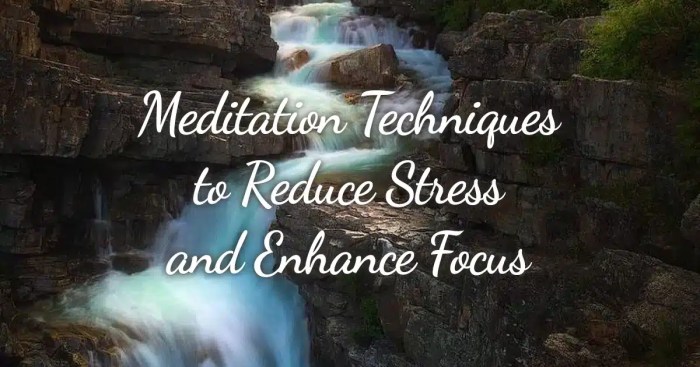
Creating a calming and peaceful meditation space at home is essential for reducing negative stress effectively. The environment plays a crucial role in enhancing the overall meditation experience and promoting relaxation.
Setting up a Peaceful Meditation Space
- A dedicated space: Designate a specific area in your home for meditation to create a sense of sacredness and separation from daily distractions.
- Comfortable seating: Choose a comfortable cushion or chair to sit on during meditation to ensure proper posture and relaxation.
- Natural light and plants: Incorporate natural elements like plants and sunlight to create a soothing and refreshing atmosphere in your meditation space.
- Clutter-free environment: Keep the space tidy and free from clutter to promote a sense of calmness and tranquility during meditation.
Importance of a Calming Atmosphere
- Reduces distractions: A peaceful environment minimizes external distractions, allowing you to focus better on your meditation practice.
- Promotes relaxation: A calming atmosphere helps in inducing a state of relaxation and tranquility, facilitating stress reduction and mental clarity.
- Enhances mindfulness: Creating a serene space encourages mindfulness and deepens the connection with your inner self during meditation.
Enhancing the Meditation Experience
- Soothing music: Play soft and gentle music in the background to enhance relaxation and create a harmonious ambiance for meditation.
- Aromatherapy: Use essential oils like lavender or chamomile to create a calming scent and promote relaxation during meditation.
- Candles or incense: Light candles or burn incense to stimulate the senses and create a serene atmosphere conducive to meditation.
Incorporating Mindfulness into Daily Life: How To Meditate For Reducing The Effects Of Negative Stress
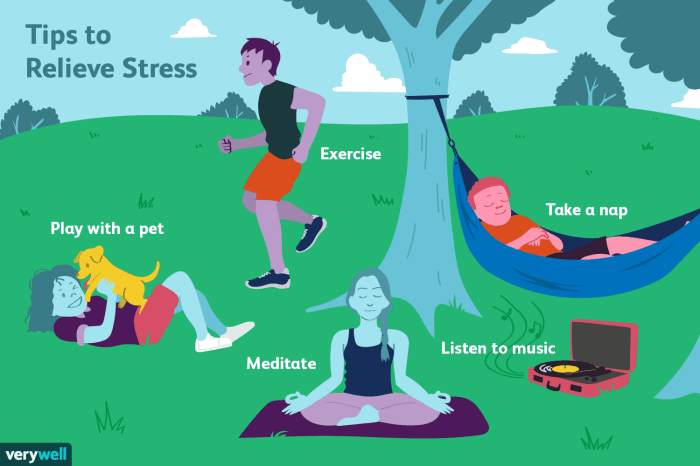
Mindfulness plays a crucial role in reducing stress by helping individuals focus on the present moment without judgment. By incorporating mindfulness practices into daily life, one can effectively manage negative stress and improve overall well-being.
Practicing Mindful Breathing
One way to integrate mindfulness into everyday activities is by practicing mindful breathing. Take a few moments throughout the day to focus on your breath, noticing the sensation of air entering and leaving your body. This simple practice can help calm the mind and reduce stress levels.
Mindful Eating, How to Meditate for Reducing the Effects of Negative Stress
Another way to incorporate mindfulness into daily life is through mindful eating. Paying attention to the taste, texture, and smell of food can help you savor each bite and become more aware of your eating habits. This practice can lead to healthier food choices and reduce stress related to emotional eating.
Mindful Walking
Engaging in mindful walking is a great way to bring awareness to your body and surroundings. Focus on each step you take, the sensation of your feet touching the ground, and the sounds around you. This practice can help ground you in the present moment and reduce feelings of anxiety or overwhelm.
In conclusion, mastering the art of meditation not only alleviates negative stress but also cultivates a sense of inner peace and mindfulness, ultimately leading to a healthier and more balanced lifestyle. Dive into the world of meditation and discover the transformative power it holds in combating stress and enhancing overall well-being.